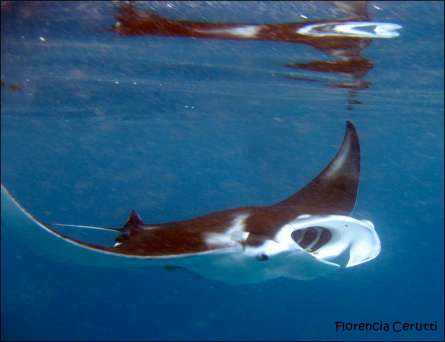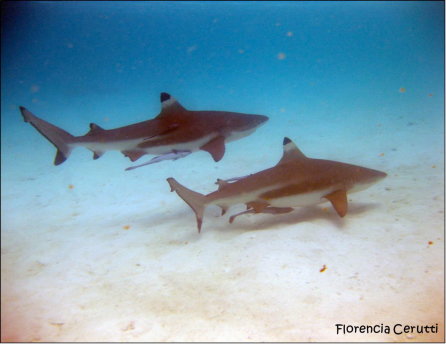Marine Life & Conservation
Indonesia’s First Shark Sanctuary

Shark and Ray conservation is high on the agenda of many scientists and is a subject written about by even more conservationists. I am getting quite a few shark conservation blogs coming through now as more people are driven to write and share their experiences and feelings. All I can say is keep them coming. It shows we care.
We are finally getting into an era where people who are not directly involved with environmental or biological sciences are getting more conscious about our planet’s endangered natural sources. However, the knowledge that actually manages to get to our societies is limited and seems to be very focused on a couple of global ‘fashion’ issues like climate change, saving the dolphins, or transgenic corn. Nothing against that, but there are so many scientific studies, so many other important topics, and so little that passes to our society that it almost seems like a waste. This narrowed-down flow of information also creates a phenomenon that is sort of known as ‘the science/society gap’ where much needed information gets lost. So now I’m writing about the science I’m involved with, not reinventing the wheel here, but instead aiming to ‘fill in some of the gap’ on the topics I love and study: marine conservation and sharks-&-rays .
Now, one of the biggest recent news for sharks & rays is the declaration of a shark sanctuary in Raja Ampat, West Papua, Indonesia (http://blog.conservation.org/2013/02/raja-ampat-launches-indonesias-first-shark-sanctuary/). This is the first shark sanctuary in Indonesia and is a major achievement of the local Papuan communities, Indonesia’s government, and NGOs (Non-government organizations) working in this area. But to understand what the problem is with sharks & rays and why this sanctuary is such an achievement, I will start by explaining what the problem is.
Black tip sharks are now protected in the Shark Sanctuary.
Besides being amazing creatures, sharks & rays are predators and have a very important role in keeping a balanced and healthy marine ecosystem. On the other hand, their populations support intensive fisheries and, therefore, human livelihoods all over the world. Sharks & rays occur in every ocean and in every ocean they are fished: from Mexico to Chile, from Japan to Australia, from UK to Cairo, from India to South Africa; everywhere. Generally, the meat is locally consumed, but the biggest trade and threat is their fins and/or gills which get exported to China to be used in traditional medicine and in traditional soup. Problem is, these animals grow very slow, they take a long time to be mature enough to reproduce, they have low numbers of pups, and they reproduce nowhere near as often as other fish that support similar intensity of fishery like tuna; their life characteristics are more similar of that of a whale or an elephant than that of a tuna or a sardine. The consequence of this is that sharks & rays cannot keep up with the intensive fishing they are subject of, nor do they have much chance to recover after been overfished.
The brighter side is that the importance of sharks & rays has been recognized in science for a while now, and it’s finally getting recognized too by the general public and government policy as noted with the recent addition of some species of sharks to the CITES list. Many countries, particularly those we called ‘developed nations’, have invested efforts in managing and conserving their populations of sharks and rays. However, many other nations are big consumers of this resource and have much less capacity for management or alternative of food sources.
Indonesia is one of the nations with the highest diversity of marine life but, sadly, it also has the largest fishery of sharks & rays in the world.
In a remote corner of Eastern Indonesia, although in the centre of the Coral Triangle (http://worldwildlife.org/places/coral-triangle), the government of a beautiful archipelago called Raja Ampat has managed to declare their waters a sanctuary where no extraction of sharks & rays should happen from now on. The local communities do not depend on this resource but are rather interested in looking after what is traditionally considered their water territories. Foreign fisheries are responsible for the shark & ray fishing in this area and they do this illegally. Moreover, the diving and marine eco-tourism industry at Raja Ampat is growing, providing an opportunity for an ‘environmentally conscious’ tourism that can appreciate this magnificent creatures alive rather than dead. The potential for sharks & rays to provide better incomes and livelihoods through tourism in this area is huge. So, I honestly think this is a great achievement and I may even venture to say that Indonesia is now one of the leaders in sharks and rays conservation!
Manta rays are also protected in the Shark Sanctuary.
However, it’s quite not the end but rather the start of sharks & rays conservation in this area. It was a long way and significant hard work was invested by many people to get this sanctuary finally declared, but there is still more work to do to implement it and monitor its success. Education, implementation, and monitoring of sharks & rays populations should now be the next steps to make this spot a real sanctuary where these amazing animals don’t go extinct and yet aid in the economic sustainability of the local communities.
So now I wonder, who’d be next nation lining up for sharks & rays protection?
Marine Life & Conservation
Shark Trust launches Oceanic 31 Shark Art Auction

 After a two-year tour of UK art galleries, community spaces and aquariums, the Shark Trust’s acclaimed Oceanic31 exhibition takes its final bow at the Royal Geographical Society later this month. And the unique collection of artwork, depicting 31 species of oceanic sharks and rays, donated by 31 artists, is now open for bids from art lovers and shark enthusiasts. The online auction, launched today, will close on the 7th December at 8pm (BST). The money raised will support the Shark Trust Oceanics Programme.
After a two-year tour of UK art galleries, community spaces and aquariums, the Shark Trust’s acclaimed Oceanic31 exhibition takes its final bow at the Royal Geographical Society later this month. And the unique collection of artwork, depicting 31 species of oceanic sharks and rays, donated by 31 artists, is now open for bids from art lovers and shark enthusiasts. The online auction, launched today, will close on the 7th December at 8pm (BST). The money raised will support the Shark Trust Oceanics Programme.
People can now bid on 27 of the artworks by visiting this website:
https://superstars-auctions.com/sharktrustauction
It is a chance to own a beautiful piece of original art and to support the Shark Trust. The timing of the auction also means that these would make a very special Christmas gift for any shark-lover.
- Bigeye Thresher Shark by Janina Rossiter
- Carcharodon carcharias by Jimmy Higgs
- Croc VR 2030 by Tom Mead
- Oceanic Whitetip by ATM
- Silky Street by ScapaJoe
The diversity of pieces mirrors that of the sharks and rays they represent. You can bid on paintings, digital creations, sculptures, mixed media and more. You can pick your favourite artist or species of shark. Or you can select the perfect artwork to make a statement in your home or office. Whichever you choose, you will be supporting the work to protect these amazing animals.
One of the pieces of art has been selected to be auctioned live by Steve Backshall at the For the Love of Sharks event at the Royal Geographical Society in London on the 29th November. In addition to this, two further pieces will be raffled at this event, giving people a chance to win an incredible piece of shark art. For the Love of Sharks is the Shark Trust’s flagship evening. A night to celebrate sharks. Steve Backshall is the headline speaker at this event that will see other prominent shark advocates join him on stage.
Tickets for the event can be snapped up here:
https://thesharktrust.org.uk/Event/flos24
Those that would like to see the Oceanic 31 exhibition have one final chance. It is being displayed at the Pavilion at the Royal Geographic Society from 26th November until the 7th December. Entry is free.
Find out more here:
https://www.rgs.org/events/upcoming-events/oceanic-31
Paul Cox, Shark Trust CEO, Said “This exhibition has given us the opportunity to reach out to a new audience. And inspire more people with the wonderful sharks and rays on which our Big Shark Pledge campaign is based. We are immensely grateful to the 31 artists who have worked so hard to create these works.”
Bid for your favourite Oceanic 31 artwork here:
https://superstars-auctions.com/sharktrustauction
Banner Image: Smooth Hammerhead by Alicia Hayden
Marine Life & Conservation
Meet Steve Backshall in the Bite-Back Prize Draw

Until 28 November, prizes worth a massive £10,000 – including experiences, products and tuition – feature in a line-up of items that can be won for £5 in an online prize draw to celebrate Bite-Back Shark & Marine Conservation’s 20th anniversary and help generate crucial funds for the future.
Top of the list of prizes is the chance to spend time with adventurer and wildlife expert Steve Backshall, a workout session with Nat Geo star Aldo Kane, a kayaking trip alongside white-water expert and diver Sal Montgomery and a Zoom call with ‘shark whisperer’ Cristina Zenato.
On top of that, some of the most admired companies in the diving and scuba industry have been quick to support the charity with fabulous prizes that make the £5 ticket price worth more than just a flutter.
Master Liveaboards, BSAC, Midlands Diving Chamber, Go Freediving and Blue Shark Snorkel have all generously donated experience prizes, while celebrated photographer Alex Mustard has donated a print and artists Scott Gleed and Olivier Leger have donated a sculpture and illustration to help boost the fundraising pot.
Fourth Element has donated Ocean Positive gear and LA watch company Nodus has gifted the charity a stunning dive watch. For land lovers, the charity has included a five star London hotel stay at Bankside Hotel plus a family visit to Longleat Safari Park in the roster of prizes.
Campaign director for Bite-Back, Graham Buckingham, said: “We’ve been overwhelmed with support from companies and individuals that we truly admire and who have supported us on our 20 year journey and we’re truly grateful to them all. While we feel incredibly proud of our achievements over the past two decades – and we are super excited about the next chapter – this prize draw isn’t a vanity project. It represents a real lifeline to our work and important advancements in the global protection of sharks. So we hope divers, dive clubs and even bargain hunters grab some tickets to make this a massive success.”
The charity hopes that the prize draw will generate crucial funds to launch a brand new, ground-breaking, campaign to enrol the public and increase support for the protection of sharks around the world.
To enter the competition visit www.bite-back.com/prizedraw. The prize winners will be announced on 1 December 2024.
-

 News1 month ago
News1 month agoIconic SS United States to become the World’s Largest Artificial Reef
-

 Blogs3 months ago
Blogs3 months agoNovoScuba’s Game-Changing Approach for Dive Store Owners: WE PAY YOU!
-

 News2 months ago
News2 months agoBook Review – 52 Assignments: Underwater Photography
-

 Gear News2 months ago
Gear News2 months agoDYNAMICNORD – New German diving brand enters the British market
-

 News2 months ago
News2 months agoExploring Cenote El Pit: A Diver’s Dream
-

 Gear News2 months ago
Gear News2 months agoTry BARE drysuits (and maybe even win one!) this Friday with Sea & Sea at North West Dive Fest
-

 News3 months ago
News3 months agoComing Soon – 52 Assignments
-

 News3 months ago
News3 months agoSave £200 per person per week at Pole Pole Lodge with Dive Worldwide









